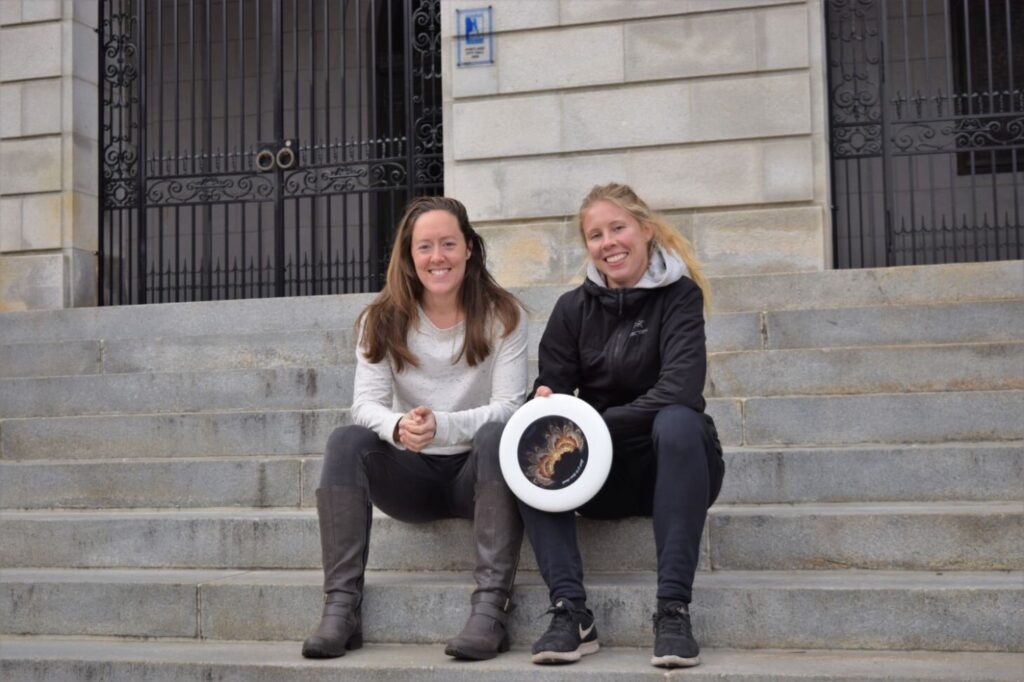Maddie Purcell is a professional Ultimate Frisbee player and a co-founder of the Portland Rising in the Premier Ultimate League. The Premier Ultimate League was created in 2018 with four teams, and has since expanded to include eight teams around the country. Below, Purcell talks with Just Women’s Sports about the foundation of the Premier Ultimate League and her journey with the sport.
Can you give us a little background on the Premier Ultimate League and the Portland Rising? How did it all come to be?
Ultimate frisbee started in New Jersey and was a grassroots sport for a while. With ultimate, there are men’s, women’s and mixed teams. Having a sport where multiple genders play on the field at the same time leads to what seems like an opportunity for gender equity all the way up. A professional men’s team started in 2012 and a lot of the community was like, “Wait, why just men’s?” Why are we feeding into this sports narrative that puts men first and then women as the sideshow? As a female athlete, it was extremely disappointing to see.
The community discussed this in different pockets for a long time. There were some showcase opportunities here and there for women’s teams, but it was nowhere close to equitable. In 2018, the idea came about for the Premier Ultimate League, which is for women and non-binary folk. We had a pilot season in 2018 with four teams who played a couple of games. Then, we had the full launch in 2019 with eight teams from across the Central, Eastern and Southern parts of the country, as well as a team from Colombia. The first season was so successful that we were able to expand by 50% in year two. And that’s where Portland Rising came into the picture. Portland has a lot of minor league teams who get a lot of support from the community. And yet, we’re just not seeing women on the professional sporting field. For us, it seemed like a responsibility and a privilege to make this happen.
How did you personally get involved in ultimate frisbee?
I came to ultimate frisbee pretty casually. I first touched a disc in eighth grade but I couldn’t really throw. I had a group of friends who would play ultimate with like 25 people on the field — normally it’s 7v7. We would huck it one way and then huck it the other. It was not good ultimate, but I got a little taste of the bug. I started playing in the Portland summer league when I was in college.
I went to Colby College in Maine and when I graduated, I was like, “Okay, what now?” I had some tough personal things going on and I really missed physical activity and team sports. I started playing for club ultimate teams, since there weren’t any professional teams, and it was a lot of fun. At that point, a lot of people had started playing in college, so I wasn’t very far behind the curve in terms of disc skills.
In a lot of women’s sports leagues, players have to work multiple jobs to maintain a steady income. Is that a similar situation in the Premier Ultimate League?
Yes. There are a few players in the men’s professional league who play for their career. I’m not sure if there are any in the women’s league. For Rising, our five year goal is to enable any rising player who wants to play ultimate as their career to be able to do so. We want it to be a combination of team pay, sponsorship endorsements, and things like that. For players on our team, that’s very exciting. Professional women’s ultimate didn’t exist until two years ago, so the concept of being able to get paid for something that players have invested so much into is awesome. And also, club ultimate can be very expensive — flying to tournaments and paying for your own uniforms. We’ve had a lot of conversations around who’s left out of that. My hope is that we’ll be able to change those barriers so everyone has the opportunity to access the professional level.
Can you talk more on how the league is trying to break down those barriers and bring people in?
I think it’s imperative with understanding the world a little better to first understand the ways that systematic discrimination have impacted absolutely everything in our country. As a league, we are putting half of our resources into equity work to build a sustainable and equitable organization over the next year. Part of that is just because it is the right thing to do, but there is also opportunity there. What does it look like to build an organization that gives representation and power and prestige to folks who haven’t previously had it?
After George Floyd was murdered, a lot of people, myself included, woke up on a bigger level. As a league, we realized that we had gotten some social credit for being an inclusive and forward-looking organization. But a lot of the people benefiting from it, percentage-wise, were still just white women, who were getting more credit for being on the socially just side of things without necessarily spreading their resources to the extent that they should be. So yeah, we’re working on it really intentionally and we’re looking at the WNBA as great role models.
Why do you think it is so important for athletes to speak out on social issues?
There’s nothing like rooting for sports and the emotional connection you can develop to teams and specific players. We saw it with Kobe, we see it with Diana Taurasi, Megan Rapinoe, and Colin Kaepernick. It’s incredible when you see athletes recognize that we love being fans of sports, and they take that attention and direct it somewhere where it can do some good.
One of our athletes, Hannah Baranes, did a birthday fundraiser recently and she was talking about how, as a young child, she was very behaviorally challenging. And because she’s white and because of the system, she was able to have those behavioral challenges addressed. She was given outlets, like sports, and now she is playing at the professional level. If she hadn’t had that privilege, maybe it would have looked like the court system or juvenile detention. So, I think there’s a lot of understanding on our team and a lot of desire to help create better outcomes.
Taking a step back here, but how do you recruit players to join the league?
We’ll see moving forward. The first year, we held an open tryout because there had been no professional ultimate team in New England before. We sent out invites and opened it up to all corners. We had about 115 athletes come out and the energy in that room was insane. I was surprised the roof stayed on that first tryout. And the talent, too. Getting to see ultimate at that level and having it be inclusive was really cool.
We signed 27 players to the roster and then when it became clear that we weren’t going to play this year, we gave everyone an opt out clause. So far, 25 players chose to stay with the Rising through this extended offseason. Our hope is that many of those 25 players will be on the roster next year, and then we’ll see what we need and who’s available. I doubt we’ll do an open tryout again, but maybe we will have a community pickup game to give people opportunities to be seen.
How has COVID-19 affected your team and the growth of the sport?
Honestly, I don’t think we’ll know the whole story until like three years from now. Within the team, people are dealing with it in different ways. Everyone has been affected in some way. People have lost relatives, people have lost jobs, and just the mental health struggle of it all is impacting everyone. Most players don’t have a gym, so it has been a challenge to keep our bodies in shape and our minds in shape. But people are also taking this time to educate themselves and take action. I’m really proud of the way everyone has dealt with it.
For the sport itself, that’s a really good question. I’m very optimistic about Portland, but the sport, as a whole, I don’t know. Ultimate will always exist, but a lot of ultimate companies are struggling without game play. I will say that, while every sport is important to the people who play it, most ultimate players find their identity in ultimate. I’ve never felt this almost cultish excitement and love for a sport until ultimate. So, yes, there is a pandemic and we have shut down for a year, but I’m excited to build from the other side.
What is it about ultimate frisbee that is so different from other sports?
Are you familiar with “Spirit of the Game”? It’s the guiding principle of ultimate. Ultimate doesn’t use referees, except at the men’s professional level for some reason. And without refs, there’s this level of integrity. It’s also just the fun of it. For some people, Spirit of the Game means a dance party and for some people it means competing at the highest level. People have different definitions, but Spirit of the Game means something to everyone who plays ultimate and it creates this different culture.
What are your hopes for the future of ultimate?
In Portland, we want to make ultimate a mainstream sport and the groundwork is there to do it. Our community in Portland loves being fans and loves supporting our town. The community is ready for a women’s professional team and we want to promote women competing at the highest level. Across the sport, there is a lot of work to be done to reach full equity and full inclusion. We want to make ultimate a safe community for everybody, not just the people who are at the core of it already. There are a lot of questions like is ultimate going to be in the Olympics soon? What kind of investment will there be at the pro level versus the youth level? But definitely all of it is moving towards growth.

